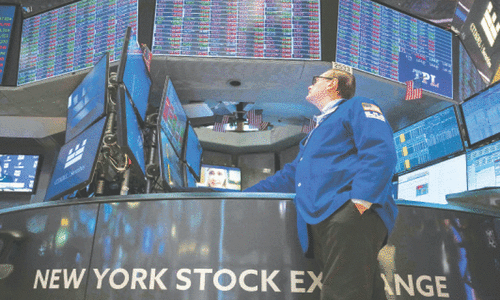WASHINGTON: Global policymakers gathering in Washington this week breathed a collective sigh of relief that the US-centric economic order that prevailed for the past 80 years was not collapsing just yet despite Donald Trump’s inward-looking approach.
The spring meetings of the International Monetary Fund and the World Bank were dominated by trade talks, which also brought some de-escalatory statements from Washington about its relations with China.
But some deeper questions hovered over central bankers and finance ministers after Trump’s attacks on international institutions and the Federal Reserve: can we still count on the US dollar as the world’s safe haven and on the two lenders that have supported the international economic system since the end of World War Two?
Conversations with several policymakers from all over the world revealed generalised relief at Trumps scaling back his threats to fire Fed Chair Jerome Powell, the guardian of the dollar’s international status whom he had previously described as a “major loser”.
And many also saw a silver lining in US Treasury Secretary Scott Bessents call to reshape the IMF and World Bank according to Trump’s priorities because it implied that the United States was not about to pull out of the two lenders that it helped create at the Bretton Woods conference of 1944.
“This week was one of cautious relief,” Austria’s central bank governor Robert Holzmann said. “There was a turn (in the US administration’s stance) but I fret this may not be the last. I keep my reservations.”
A politicisation of the Fed and, to a lesser extent, the hollowing out of the IMF and World Bank are almost too much to fathom for most officials. Deprived of a lender of last resort, some $25 trillion of bonds and loans issued abroad would be called into question.
No alternative
At the heart of policymakers’ concerns is that there is no ready alternative to the United States as the world’s financial hegemon — a situation that economists know as the Kindleberger Trap after renowned historian Charles Kindleberger.
To be sure, the euro, a distant-second reserve currency, is gaining popularity in light of the European Union’s newly found status as an island of relative stability. But policymakers were adamant that the European single currency was not ready yet to dethrone the dollar and could at best hope to add a little to its 20 per cent share of the world’s reserves.
Of the 20 countries that share the euro only Germany has the credit rating and the size that investors demand from a safe haven. Some other members are highly indebted and prone to bouts of political and financial turmoil — most recently in France last year — which raise lingering questions about the bloc’s long-term viability.
And the euro zone’s geographical proximity to Russia — particularly the three Baltic countries that were once part of the Soviet Union — cast an even more sinister shadow. With Japan now too small and China’s heavily managed currency in an even worse position, this left no alternative to the dollar system underpinned by the Fed and the two Bretton Woods institutions.
In fact, the IMF and the World Bank could scarcely survive if their largest shareholder, the United States, pulled out, officials said.
“The US is absolutely crucial for multilateral institutions,” Polish Finance Minister Andrzej Domanski said. “We’re happy they remain.” Still, few expected to go back to the old status quo and thorny issues were likely to await.
But some observers argued that the market turmoil of the past few weeks, which saw US bonds, shares and the currency sell off sharply, might have been a shot in the arm as it forced a change of tack by the administration.
“When President Trump talked about firing Jay Powell, the fact that markets reacted so vigorously to that ended up being a disciplining reality just reminding the administration that, if you cross that line, it could have some very severe implications,” said Nathan Sheets, global chief economist at Citi.
Published in Dawn, April 27th, 2025


































